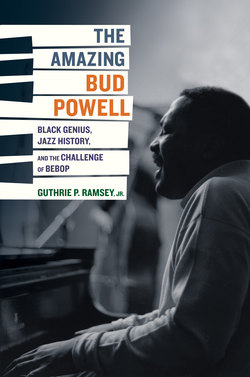The Amazing Bud Powell

Реклама. ООО «ЛитРес», ИНН: 7719571260.
Оглавление
Guthrie P. Ramsey. The Amazing Bud Powell
Отрывок из книги
Michael P. Roth and Sukey Garcetti have endowed this imprint to honor the memory of their parents, Julia and Harry Roth, whose deep love of music they wish to share with others.
In addition, the publisher gratefully acknowledges the generous contribution to this book provided by the Research Opportunity Grant from the School of Arts and Sciences at the University of Pennsylvania.
.....
Wonderful times with rooms and audiences, compared to respect among peers and the real thing—a distinct dichotomy produced in two very different cultural spaces. Harlem was a woodshed. It was a rite-of-passage experience in which bebop musicians came of age. Fifty-Second Street, on the other hand, represented the larger marketplace, the media, and commercial industry. With proper exposure on the Street, an artist could gain access to record contracts and prestigious concert bookings in halls that previously had been off-limits. A bebop musician’s career soon depended on having others manage or navigate this move. Thus, bebop’s journey to 52nd Street represented another important rite of passage: it became a mainstream business. The economic reality that bebop musicians could not sustain careers in Harlem is an important point to keep in mind while reevaluating the notion that bebop was somehow exclusively anticommercial.
Bebop musicians found themselves turning to audiences outside Harlem for wider recognition. They could not achieve lucrative careers away from the white publications or from downtown audiences. Furthermore, they could not help but care what critics wrote about their music, nor could they thrive economically without them. Miles Davis noted that critics became keenly interested in bebop only after musicians began playing on the Street, which provided them with money and media exposure. Nightclubs such as the Three Deuces, Kelley’s Stables, the Onyx, and the Downbeat Club became more important to bebop’s survival than Harlem clubs because of the economic opportunities available in midtown Manhattan.
.....